
Press release -
Traditional male gender roles still dominate in entertainment industry
The characters that actors portray in films, television and on stage conform too closely with traditional gender roles – according to new research by academics at Northumbria and Durham universities.
Interestingly, the male actors questioned felt strongly that the characters they were asked to portray were more stereotypically masculine than they identified as themselves.
In contrast, the female actors taking part in the research identified more closely with the gender traits of the characters they were playing – perhaps demonstrating positive changes within the entertainment industry following the #MeToo movement and campaigns for a 50:50 gender balance.
More than 300 actors were questioned about their experiences of being required to conform to traditional gender roles in the course of their work, and the disparity between their acted and ideal characters for the research, which was carried out by Clare Cook and Thomas Pollet of Northumbria University, and Jamie Callahan of Durham University.
Their findings have been published in the American Psychological Association’s journal, Psychology of Aesthetics, Creativity, and the Arts.
Speaking about their findings, Clare Cook, of Northumbria University’s Department of Psychology said: “There has been lots of research carried out into how the audience perceive and identify with the gender roles of characters on stage and screen, but up until now nobody has questioned the actors who are actually playing these roles.
“What we found interesting was that it was the male actors who felt least represented by the characters they were being asked to play, with many saying the roles available were very gender typical and overly masculine.
“The female actors we surveyed felt their characters more closely resembled how they identified themselves as women, which is a really positive step forward and perhaps shows the positive impact that having more women working within the creative industries over the last few years is having.”
While the vast majority of those questioned identified as either men or women, a small number of participants in the study – less than 4% – identified as non-binary, third gender or other gender identity or preferred not to specify their gender identity. As such, analyses which relied on gender groupings only included participants who identified as men or women. However, many of the actors – both men and women – said they would like to play less gender typical roles.
“While it appears there have been positive changes, there is still more work to do in ensuring the roles portrayed in the entertainment industry more accurately reflect society as a whole and do more to promote gender equity,” Clare added.
The academics found that both male and female actors were required to portray traditional gender roles, but that men were required to conform with these traditional notions of gender to a greater extent, resulting in the broadcast of a masculinized ideal.
Both male and female actors indicated they would prefer to portray characters that conform less with traditional gender roles than their most recent character.
Speaking about the findings, Jamie Callahan, of Durham University Business School, said: “The entertainment industry both reflects and reinforces culture. Our study shows that “if you can see it, you can be it” has improved for women and the roles they get to play, and this helps move the dial on gendered social norms that get reinforced. But, to come closer to gender equity in society, the entertainment industry needs to revamp the roles they create for men.”
Participants in the study ranged in age from 18 to 86 and were recruited through actors’ groups, casting groups and personal networks.
Topics
UNIVERSITY OF THE YEAR 2022 (Times Higher Education Awards)
Northumbria is a research-intensive university that unlocks potential for all, changing lives regionally, nationally and internationally. Find out more about us at www.northumbria.ac.uk
--- Please contact media.communications@northumbria.ac.uk with any media enquiries or interview requests ---







